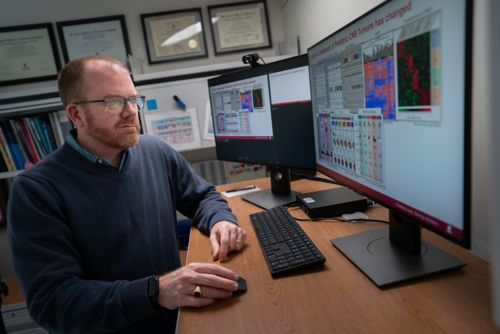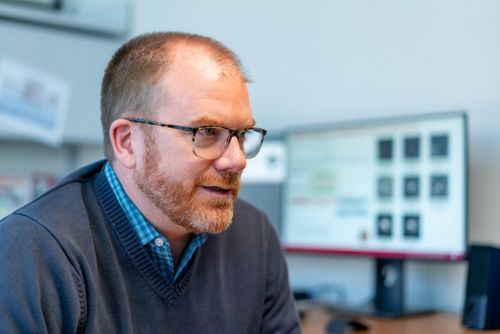St. Jude Family of Websites
Explore our cutting edge research, world-class patient care, career opportunities and more.
St. Jude Children's Research Hospital Home

- Fundraising
St. Jude Family of Websites
Explore our cutting edge research, world-class patient care, career opportunities and more.
St. Jude Children's Research Hospital Home

- Fundraising
Giles Robinson, MD
Improving survival and reducing treatment-related morbidities in children with central nervous system tumors
Overview
Pediatric central nervous system (CNS) tumors are complex and challenging. The goal of my work is to improve survival and reduce toxicity in children with CNS tumors. Over the past few decades, the biological understanding of these diseases has increased, but a more foundational understanding is needed to better inform therapies. To meet this need, I explore the genomic and molecular basis of central nervous system tumors and link this with the patient experience, treatment and outcomes. I use this knowledge to guide therapeutic decisions and identify potential targets for future therapies.

Robinson Research Summary
As a pediatric neuro-oncologist, I strive to make treatment decisions that best suit an individual patient’s needs, which means I must first understand the tumor itself. From almost two decades of clinical and research experience, I found the foundation of that understanding to be at the molecular level. My translational research led to the discovery of the molecular distinctness of these tumors, which began with initial discoveries related to the heterogeneity of medulloblastoma, a tumor once considered to be a uniform pediatric disease. By delving deep into the molecular foundation of pediatric brain and spinal cord tumors, I am convinced that we can reshape the way we approach and understand these diseases.
I continue to lead research and clinical initiatives that seek to improve treatments and outcomes for children by taking an informed, risk-stratified approach to care. To ensure we continue to gather more information that leads to therapeutic advancements, my clinical research work focuses on the following areas.
Clinical trial development
I am a strong advocate of clinical trials because they offer the best and safest way to advance therapy. Clinical trials represent our informed attempts to improve therapy in a controlled setting that is safeguarded with rigorous oversight to ensure children have the best opportunity to benefit. In my career, I have developed, launched and operated a number of clinical trials to keep improving therapy.
As co-PI of the multi-institutional protocol SJMB12, I opened the first clinical trial to tailor therapy according to the molecular makeup of medulloblastoma. Additionally, I launched a multi-armed clinical trial, SJDAWN, for recurrent or relapsed CNS tumors that targets pathways commonly aberrated or mutated in these tumors.
More recently, building on my work with medulloblastoma, as well as collaborative efforts with the Northcott laboratory that showed disparate outcomes between the molecular groups of medulloblastoma (SHH and Group 3) in very young children (age 0-5 years old), I launched a molecularly driven, risk-stratified multi-institutional protocol with Aditi Bagchi, MD, PhD, called SJiMB21. The goal of this trial is to improve outcomes for the youngest patients through our enhanced molecular understanding of the disease. Using state-of-the-art methylation testing, developed in collaboration with the Orr laboratory, this trial treats SHH medulloblastomas without any radiation and Group 3 medulloblastomas, which are more aggressive, with a delayed radiation-reduced strategy.
For low-grade gliomas, I launched the SJ901 trial with Anna Vinitsky, MD, which uses a novel brain-penetrant MEK inhibitor (mirdametinib) as a targeted treatment for children with inoperable or advanced tumors that cannot be cured with surgery. The trial aims to determine the effectiveness of the inhibitor as an alternative treatment to chemotherapy or radiation therapy.
Additionally, I have been working with the Northcott laboratory to identify cancer biomarkers in cerebrospinal fluid and insert these findings into clinical trials to improve early detection of recurrence and better treat relapsed disease. As Director of the Division of Neuro-Oncology I hope to encourage, inspire and mentor division faculty to launch a series of cutting-edge trials that cover all types of pediatric brain and spine tumors.
Examining treatment-related morbidity
As I work to determine effective, targeted treatments for our patients, I also aim to reduce the treatment-related morbidities and neurocognitive effects so often observed by frontline treatments, such as surgery, radiation and chemotherapy. Adopting a molecularly defined, risk-based stratification approach in the clinical trials I lead and promote is imperative to mitigating treatment-related morbidities in our patients. Survival is not the only outcome measurement I focus on as my efforts aim to ensure our treatment measures do not impede quality of life.
Laboratory model development
As we continue to learn more about pediatric CNS tumors, we are better able to model these diseases in the laboratory. The ability to create more informed laboratory models of disease allows us to assess experimental therapeutics that have translational potential in the clinic. Using the advanced understanding of tumors that molecular profiling enables, I facilitate a partnership with the Neurobiology & Brain Tumor Program to create advanced models that will speed preclinical testing. Leveraging collaborations with the Departments of Chemical Biology and Therapeutics and Pharmacy and Pharmaceutical Sciences, I plan to use these advanced models to seek novel drugs and how they can be applied across the CNS disease landscape.
Organizing patient-derived data
As technological capabilities and collaborative efforts continue to expand, our knowledge and access to molecular data grows. However, our ability to organize and share this data is paramount if we aim to get the most out of this previous resource. To facilitate the collecting, aggregating, storing and sharing of such large amounts of patient-derived molecular data, I have forged a partnership with the Department of Computational Biology. My goal is to harness this vast amount of data into a user-friendly computer portal, where the fruits of our research are accessible to all. This will give providers and scientists interested in improving pediatric CNS tumor therapy the ability to explore data and come up with novel therapeutic advances, advancing care for children with central nervous system tumors beyond the walls of St. Jude.
Selected Publications
About Giles Robinson
Dr. Giles Robinson is a Member in the Department of Oncology and serves as the Director of the Division of Neuro-Oncology and co-lead of the Cancer Center Neurobiology and Brain Tumor Program. He has been a faculty member in the Division of Neuro-Oncology at St. Jude since 2011, during which time he has led major research and clinical initiatives that have informed new, molecularly informed treatment approaches for some of the most difficult-to-treat pediatric tumors affecting the central nervous system. Aside from his numerous leadership roles within St. Jude, Dr. Robinson belongs to the NCI-sponsored consortium of Children’s Oncology Group (COG) and the Pediatric Brain Tumor Consortium (PBTC). At the core of Dr. Robinson’s work is a belief that through an increased understanding of genomics, therapy can be improved.

Contact us
Giles Robinson, MD
Member
Director, Division of Neuro-Oncology
Co-Leader, Cancer Center Neurobiology and Brain Tumor Program
Department of Oncology
MS260, Room C6069
St. Jude Children’s Research Hospital

Memphis, TN, 38105-3678 USA GET DIRECTIONS